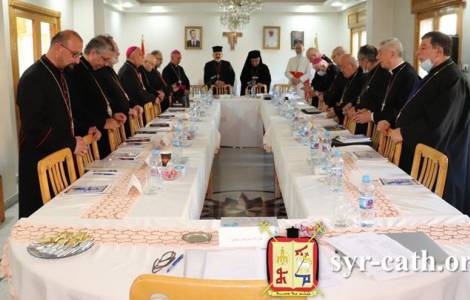Aleppo (Agenzia Fides) – Syria and the entire Middle East continue to experience a time of pain and suffering, in which the “appalling economic conditions” and the dramatic exodus of the younger generations are intertwined with “unsustainable geopolitical pressures” that are exerted on the daily lives of all the peoples of the region. This is the scenario faced by the Patriarchs and Bishops gathered in Aleppo, at the headquarters of the Apostolic Vicariate for Catholics of the Latin Rite, to participate in the Council of Heads of Catholic Churches present in Syria. The Assembly began on Tuesday, May 18, and its various sessions will last until Thursday, May 20.
The meeting, chaired by the Syrian Catholic Patriarch Ignace Youssif III Younan and Melkite Greek Catholic Patriarch Youssef Absi, was also attended by Italian Cardinal Mario Zenari, Apostolic Nuncio in Damascus. In their introductory remarks, Patriarch Younan and Patriarch Absi outlined the issues that will be addressed in the different working sessions, starting with the role that Caritas Syria and other Catholic works can offer in the reconstruction of the country devastated by years of conflict and is currently also struggling with the pandemic emergency of Covid-19. In particular, Patriarch Younan recalled the urgency of supporting and favoring young people especially in the field of educational, who have seen their years of growth overwhelmed by conflict, while Patriarch Absi offered reflections on the need to face the growing social polarization that separates the few rich from the multitudes of Syrians reduced to hunger.
In his speech, Cardinal Zenari drew attention to the celebration of the Year dedicated to the family and to the figure of Saint Joseph, according to the indications of Pope Francis, and recalled the importance of supporting and developing the work of Caritas Syria in favor of the growing multitude of poor Syrians, whatever their ethnic or religious group. The economic sanctions implemented against Syria, which culminated in the “Caesar Act” of the US administration of President Donald Trump and remained in force even after the arrival of Democrat Joe Biden in the White House, affect the most vulnerable Syrian citizens “in the heart of their daily life”, so much so that “the garbage containers in the streets have become a source of food for the poorest”.
With this image of ordinary and daily affliction, Riad Sargi, Executive Director of Caritas Syria, recently recounted the daily nightmare inflicted also due to the international measures of economic boycott on the weakest sections of a people exhausted by ten years of wars and violence. The humanitarian catastrophe looming over Syria was described in the message-appeal released on Tuesday, March 23, by Caritas Internationalis (see Fides, 24/3/2021) to invoke the suspension of the sanctions imposed with the declared intent to hit the government of Damascus, and that in fact the weakest sectors of the population suffer on their skin.
Source: Agenzia Fides






